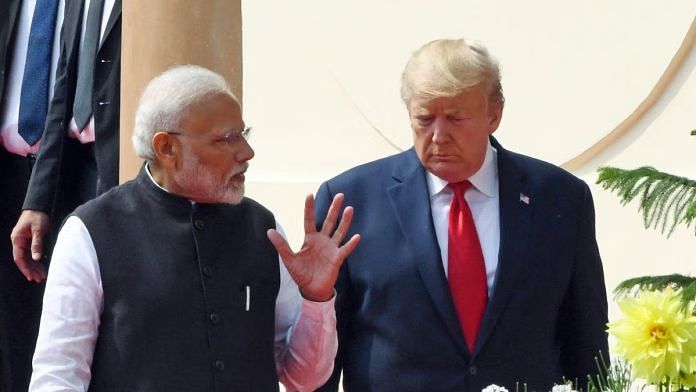In an explosive announcement on Truth Social, US President Donald Trump declared that India would be slapped with a 25% tariff plus additional penalties starting August 1, accusing New Delhi of maintaining “obnoxious” non-monetary trade barriers, buying energy and military hardware from Russia, and resisting U.S. pressure during trade negotiations.

While the message was delivered in characteristic Trumpian flair, the underlying reality it betrays is far more significant: India stood its ground, refused to buckle under pressure, and prioritised strategic sovereignty and national interests over economic subservience.
Tariffs as a signal of failed coercion
Let’s be clear: the tariffs are not a punishment for bad behaviour, they are a testament to India’s refusal to surrender to Washington’s coercive tactics. At a time when the US was offering exceptions in its tariff regime to compliant allies like Japan, New Delhi walked away from the table rather than sign a one-sided deal. Negotiations were ongoing, and a waiver could have been on the cards had India agreed to allow unrestricted access to U.S. agricultural products and dilute its protective framework for domestic industries. It did not.
Instead, the Modi government held firm, valuing long-term national interest over the short-term gains of a skewed deal. Trump’s tariffs, therefore, are not a mark of failure on India’s part; they are a clear admission that India refused to yield.
Trump’s frustration exposes his lies about brokering a ceasefire between India and Pakistan during ‘Operation Sindoor’
This development also punctures Trump’s earlier claims that he brokered de-escalation during Operation Sindoor, the Indian military operation that not only avenged the Pahalgam terror attack but also exposed Pakistan’s role in cross-border terrorism as pictures of Pakistani Army officials attending funerals of UN designated terrorists surfaced online. India pounded 11 Pakistani airbases and over 9 terror camps, effectively establishing a new military doctrine: that it will no longer put up with Pakistan’s continued support to terrorism against India. A cowered Pakistan immediately pleaded for ceasefire as Indian missiles struck with precision even as its Chinese air defences were caught napping.
However, Trump fell over himself to appropriate credit for brokering a ceasefire between the two countries. He had since repeated the claim ad nauseam despite the fact that India had long maintained that there was no third party intervention between the two countries and India decided to stop only after Pakistan’s persistent begging to stop the attacks. If India had truly followed US diktats and deferred its decisions to Trump’s wisdom, it would hardly be facing trade penalties now. Trump’s fresh outburst clearly demonstrates that India made independent strategic choices, not ones choreographed from Washington.
Trump’s frustration over India’s continued purchase of Russian oil and arms exposes another inconvenient truth for the US, India is not playing by America’s Cold War-era geopolitical templates anymore.
Russian energy: A rational economic choice
India’s decision to buy Russian oil at discounted rates was a pragmatic economic move, not a political provocation. With global energy prices soaring, and Western sources often coming with geopolitical strings attached, Russia offered a cost-effective and reliable option. This helped India save billions in energy bills and keep inflation in check, a crucial factor for a developing economy with a massive energy appetite.
To expect India to shun affordable fuel just to please American optics on Ukraine is utterly unrealistic, especially when European nations themselves continued buying Russian gas well into the conflict.
Defence ties with Russia: A legacy, not a loyalty
Trump’s gripe about India’s arms purchases from Russia ignores decades of history. From Nehru and Indira Gandhi to Vajpayee and Manmohan Singh, India’s defence relationship with Moscow has been one of necessity and reliability. During the Cold War, the U.S. actively courted Pakistan to fight its Mujahideen war in Afghanistan, shutting India out of its defence markets. It was Moscow that supplied India with critical military systems through thick and thin, including during the 1971 Bangladesh Liberation War.
For Trump, or anyone in the U.S. establishment, to now expect India to junk decades worth of operational compatibility, training protocols, and logistical chains just to appease American whims is not just strategically tone-deaf, it’s logistically absurd and economically foolish.
India chooses sovereignty over subservience
At its core, this episode is not about trade. It is about sovereignty. In choosing not to bow before Trump’s aggressive style of transactional diplomacy, India has sent a message to the world: it will not become a vassal state of any global power. Be it military decisions, energy sourcing, or trade policy, India will act in its own national interest, not in the service of another nation’s foreign policy agenda.
In standing up to Trump, New Delhi has shown that it is willing to bear economic costs to preserve strategic independence—a stance that aligns with its broader vision of a multipolar world where nations are not forced into binary alliances.
Tariffs today, respect tomorrow
While the tariffs may sting certain sectors of India’s export economy in the short run, they are, in the larger scheme, a small price to pay for long-term autonomy. Trump’s imposition of punitive trade barriers is not a diplomatic defeat, but a diplomatic declaration that India won’t sell its sovereignty, even to the most powerful nation on Earth.
As India charts its path as a rising power with an independent foreign policy, economic resilience, and deepening partnerships with multiple poles of power, the message is clear: India is no one’s satellite. It is a sovereign civilisation-state, making decisions on its own terms.












